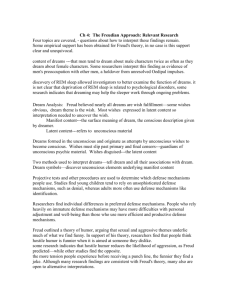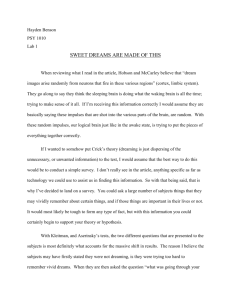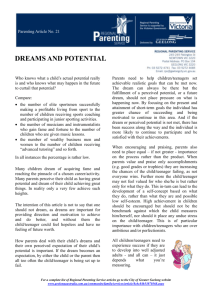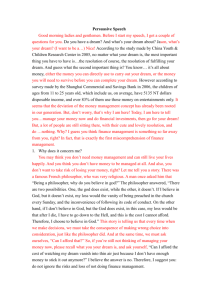Psychological Sophistication
advertisement
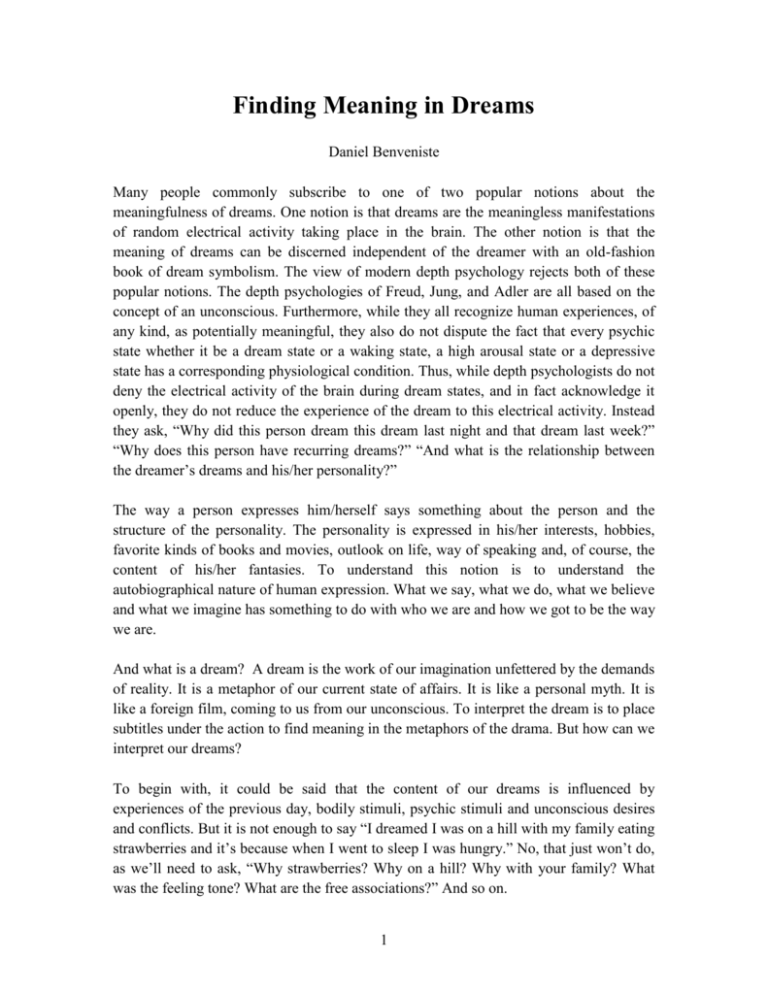
Finding Meaning in Dreams Daniel Benveniste Many people commonly subscribe to one of two popular notions about the meaningfulness of dreams. One notion is that dreams are the meaningless manifestations of random electrical activity taking place in the brain. The other notion is that the meaning of dreams can be discerned independent of the dreamer with an old-fashion book of dream symbolism. The view of modern depth psychology rejects both of these popular notions. The depth psychologies of Freud, Jung, and Adler are all based on the concept of an unconscious. Furthermore, while they all recognize human experiences, of any kind, as potentially meaningful, they also do not dispute the fact that every psychic state whether it be a dream state or a waking state, a high arousal state or a depressive state has a corresponding physiological condition. Thus, while depth psychologists do not deny the electrical activity of the brain during dream states, and in fact acknowledge it openly, they do not reduce the experience of the dream to this electrical activity. Instead they ask, “Why did this person dream this dream last night and that dream last week?” “Why does this person have recurring dreams?” “And what is the relationship between the dreamer’s dreams and his/her personality?” The way a person expresses him/herself says something about the person and the structure of the personality. The personality is expressed in his/her interests, hobbies, favorite kinds of books and movies, outlook on life, way of speaking and, of course, the content of his/her fantasies. To understand this notion is to understand the autobiographical nature of human expression. What we say, what we do, what we believe and what we imagine has something to do with who we are and how we got to be the way we are. And what is a dream? A dream is the work of our imagination unfettered by the demands of reality. It is a metaphor of our current state of affairs. It is like a personal myth. It is like a foreign film, coming to us from our unconscious. To interpret the dream is to place subtitles under the action to find meaning in the metaphors of the drama. But how can we interpret our dreams? To begin with, it could be said that the content of our dreams is influenced by experiences of the previous day, bodily stimuli, psychic stimuli and unconscious desires and conflicts. But it is not enough to say “I dreamed I was on a hill with my family eating strawberries and it’s because when I went to sleep I was hungry.” No, that just won’t do, as we’ll need to ask, “Why strawberries? Why on a hill? Why with your family? What was the feeling tone? What are the free associations?” And so on. 1 It was Sigmund Freud who recognized that the psyche, in early childhood, separated into consciousness and unconsciousness on the threshold of bodily needs and social pressures. This is why early childhood experiences are so important in the development of the adult personality and why the demands and management of bodily needs figure so prominently in psychological development. Freud noted that in the dialectic between physical development and cognitive development, the symbolic function came into play and used the early experiences of the body as metaphors to understand the ever-widening experience of the world. Thus, while Freud recognized the recurring symbols in dreams upon which previous dream books were based, he also recognized that the meaning of the dream could not be determined simply with a book of symbolic equations but required the dreamer’s own free associations to give the interpretation depth and personal context. It is in the free associations, or playful thoughts, about the dream images and themes that the metaphors of the dream images are unraveled and personal meaning is made. Freud noted that all aspects of the dream were aspects of the dreamer, that the dream images were often condensed from one or more images and displaced from one person, place or thing to another. Furthermore, these distortions served to keep the threatening, sometimes primitive and socially inappropriate content of the dreams out of consciousness. Freud emphasized the retrospective aspect of the dream stating that it pertained, for the most part, to experiences and conflicts rooted in the past but very much alive in the present circumstances. Alfred Adler is perhaps best known for his concept of the ‘inferiority complex.’ His notion of the ‘law of compensation’ is important in working with dreams as it enables us to see how some dreams present us with a view or feeling that is completely opposite to our consciously held view or feeling. And it is this opposite unconscious view, together with the conscious view, that is often important to consider. For Carl Gustav Jung the unconscious is not simply a cauldron of repressed wishes and unacceptable memories. It is also a creative unconscious capable of introducing new material into consciousness, not just replaying images of the past. While free associations were important to Jung, he found that universal symbolism embedded in art, religion, myths and rituals from all around the world was more useful in understanding the meaning of dreams than Freud considered it to be. While Freud’s view of the dream was predominantly retrospective, Jung’s view was both retrospective and prospective, meaning that for Jung the dream says something about the past in relation to the present circumstance but it also says something about the person’s potential in the future. Freud described the ‘content’ of the dream, as it is initially recalled, as the ‘manifest dream content’ and the ‘meaning’ of the dream as the ‘latent dream content’. The 2 manifest dream content and/or its latent meaning often contain material that is socially inappropriate, immoral, confused, magical, fantastic, absurd, contradictory and fragmentary. But when we recognize that dreams are not plans to be acted on or statements of literal fact, we clear the way for a playful approach to the metaphors of the dream and the desires they express. Dreams are not literal messages about objective reality but are figurative statements about our subjective experiences, our desire, our conflicts and our fears. From this vantage point, we discover that dreams typically pertain to matters of love, sex, aggression, competition, conflict, psychic injury, body image, as well as the desires and fears of sexual relations, of being grown up, of seeing and being seen, of independence, of power, of powerlessness, of abandonment and so much more. One person used to have dreams about being barefoot in a shoestore. In his therapy, however, he discovered this had little to do with actual shoes. His free associations, or playful thoughts, about these dreams drew him again and again back to his feeling of being unprepared and undefended in his career and love life. It also conjured memories of the chaos and danger he felt in his family as a young boy. As therapy progressed his dreams increasingly represented him as being more calm, finding a pair of shoes and eventually dreams of pleasurably walking in a nice pair of shoes. Some people complain that they don’t dream or don’t remember their dreams. Yet I have found that if someone wants to pay attention to his/her dreams the dreams can be stimulated by putting a journal or note pad next to the bed and writing down whatever is recalled each morning. If this is done regularly, soon enough the dreams start presenting themselves to consciousness in all their fantastic and strange metaphoric forms. You can explore the meaning of your dreams in a psychotherapy with a psychologist trained to work with dreams. But you can also have a good bit of fun following your own dreams, keeping a dream journal on your night stand and reading books like Sigmund Freud’s ‘The Interpretation of Dreams’. I think it may be impossible to read the ‘Interpretation of Dreams’ and not have it stir up one’s dream life. And whether this article has piqued your curiosity or not, sweet dreams! 3

